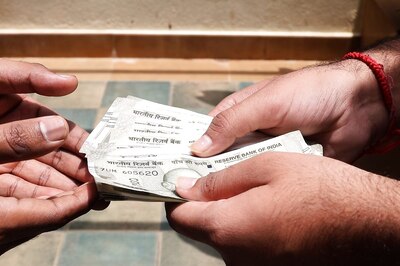
views
China has launched a new ‘digital yuan’ this year, which is controlled by the country’s central bank.
While authorities have been encouraging people for massive adoption of digital currency, according to state media reports, a central bank official has stated that Beijing will adhere to strict privacy laws and safeguard individual information in using Digital Currency Electronic Payment (DC/EP) or e-CNY.
When the digital currency was launched and China released the beta version of the digital yuan app for Android and iOS on local app stores earlier this year, it was anticipated that this move will give the Chinese government a broad array of new capabilities for keeping an eye on both its citizens and its economy.
However, as reported recently, Mu Changchun, director-general of the central bank’s Digital Currency Research Institute, said that the limited anonymity of the digital yuan is a critical component and it provides reasonable anonymous transactions.
Additionally, he said that it maintains the demand for financial security by preventing and combating illicit actions such as money laundering, terrorist financing and tax evasion.
China believes that e-CNY, issued by the People’s Bank of China, will be a traceable alternative to banknotes and coins and can be used to buy anything. For example, Mu said that e-CNY can be used to acquire gold and exchange foreign currencies just like cash and coins.
It should be noted that with more e-CNY uses anticipated in the future, to increase transparency and the efficacy of governmental programmes, some towns provided free digital cash in May to stimulate consumption and aid companies hurt by pandemic restrictions.
Chinese Digital Currency
When coins were the only form of currency, paper money was created in China over a thousand years ago. Now, with the boom in technological development, China is placing the digital yuan in a position for worldwide use and designing it to be independent of the international monetary order, where the US dollar has ruled since World War II.
But according to analysts and economists, digitisation wouldn’t be enough to make the yuan competitive with the dollar in bank-to-bank wire transactions.
However, according to research conducted by Deutsche Bank, this digital currency is being introduced by the PBOC to achieve two distinct, but connected purposes.
The first, the longer-term objective, is to develop a digital currency that can rival others like bitcoins, stablecoins and other central banks’ digital currencies (CBDC) while preserving the yuan also known as renminbi as China’s reserve currency.
The second, more immediate objective is to alter China’s current payment system by offering a digital payment option that is comparable to cash as it is widely available, inexpensive, somewhat anonymous, and encourages competition among payment service providers.
To prevent valuation discrepancies between the digital yuan and paper money like coins and bills, the Chinese central bank would rigorously control its use. Additionally, it was also stated that due to the anti-counterfeiting procedures, it will be impossible for anyone other than the central bank to create new digital yuan.
In July 2021, the central bank, in a document, highlighted the fact that one of the advantages of using e-CNY will be the greater security and privacy it provides. In the document, PBOC clearly stated how the digital currency uses a “variety of technologies, including digital certificate system, digital signature, and encrypted storage to make double-spending, illegal duplication and counterfeit, transaction falsification, and repudiation unfeasible”.
How It Works
The digital wallet, also known as the ‘shuzi qianbao’ in Chinese, is an online wallet that allows people to track and save e-CNY. It can be accessed using the digital yuan app called ‘shuzi renminbi’.
The digital yuan app is the primary way for users to use e-CNY.
On the app, users may create several digital wallets and establish settings such as daily spend limitations and the apps and services that can be paid for with the wallet, as well as link different bank cards.
Foreigners can presently only access restricted functionalities in the digital yuan app as some of the ‘higher-level’ wallet options require a Chinese identity card (those that permit higher spending limits).
Only the lowest level wallet, which has a daily spending limit of RMB 5,000 and a yearly spending restriction of RMB 50,000, is now available for sign-up without a Chinese identity card.
Inside the country, one of China’s major tech firms, Tencent said on April 7 this year that users in the 23 trial zones will be able to use the digital yuan as a payment option on its social media and payment app WeChat.
To utilise the digital yuan on WeChat, customers need to first register with WeBank, which is Tencent’s online bank.
However, in order to sign up for WeBank, users must enter a Chinese shenfenzheng ID number (an official ID document), therefore only Chinese people can currently use the digital yuan through WeChat.
Additionally, users will be able to send small sums of money (the quantity will depend on the type of digital wallet they have) to their peers, allowing them to spend the virtual cash in more casual settings, such as repaying a friend for a dinner or transferring money to a street seller. As the app supports NFC technology, users will also be able to do this simply by touching their phones together.
Furthermore, due to the usage of NFT technology, users can also spend money in their digital wallets even when they are not connected to the internet.
However, China is not the only participant in this digital currency race.
The Indian government has introduced the Central Bank Digital Currency (CBDC) in Budget 2022 to significantly increase the digital economy. It is proposed that the Reserve Bank of India will start issuing the Digital Rupee based on blockchain and other technologies.
Later, it was also reported that India would introduce its own digital currency by early 2023 that will be similar to any private company-run electronic wallet that is already accessible, with the exception that it will be a sovereign-backed facility. However, in contrast to the current mobile wallet system provided by private companies, the digital rupee blockchain is also expected to be able to track all transactions.
Read all the Latest News and Breaking News here

















Comments
0 comment